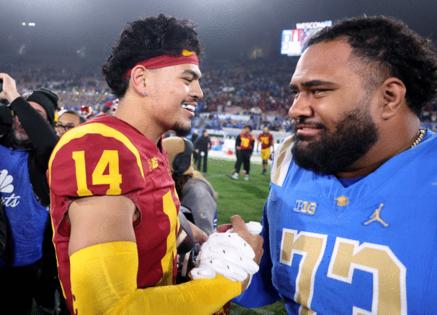Commentary: Football isn't just violence. It's democracy's schoolhouse
Published in Op Eds
The ripple effects of the brawl that broke out between Ohio State and Michigan football players in late November are still spreading. A massive scrum ensued when celebrating Michigan players tried to plant a team flag on Ohio State’s field.
Are the fines levied on each team — $100,000 — too low for high-stakes college football? Was the police response appropriate? Should flag-planting be outlawed?
Sadly, the shoves and punches on the football field reflect a broader trend surging across America: a CEO was gunned down in the street, reporters and media personalities face increasing threats, a presidential candidate was nearly assassinated. And a staggering 23% of Americans now believe that we “may have to resort to violence in order to save our country.”
Football’s popularity, and its brutality, always takes heat for its role in the larger culture of violence. One writer condemned it as “unspeakably violent” and “wrapped up in machismo, militarism, swagger and patriotism.” Another wrote that violence and danger are “the beating heart of football.”
No doubt football is suffused with gladiatorial bravado. The growing emphasis on curbing the game’s long-term health risks, especially its connections to brain injury, will benefit players and fans alike. But as the bowl games and college playoffs roll out, we should note this as well: Too much is learned from football to cast it aside.
The football field — the baseball diamond, the basketball gym, the tennis court — is where millions of Americans learn discipline, respect for opponents and the value of coordinated action. Athletic contests are a schoolhouse of democracy that inculcates the habits of civic engagement necessary for a free people to thrive. Sports — even contact sports — are part of the solution, not the problem.
Participation in sports fosters a commitment to fair play. Fans and players understand that victory has no meaning if it’s achieved dishonestly; cheating undermines the integrity of the game. We lose respect for those who steal signs or use performance-enhancing drugs to get a leg up. The same is true in civil society — when the rules are violated, the whole system is weakened. Fair play in sports mirrors the importance of fairness in democratic society and a respect for the rules of engagement set by our political tradition.
Our government is held up not just by elected officials but by processes— the separation of powers, checks and balances, the rule of law and the peaceful transfer of power through free and fair elections — that are time tested. These processes are the rules of the game. Without them democracy ends.
Sports breed civility. With the handshake at the end of a hard-fought contest, players recognize the effort, skill and fair play of the other side. Fans love watching LeBron James, but it’s his teammates and opponents who most understand his greatness, having themselves spent decades in practice and the weight room. They know how much dedication his level of excellence requires and they respect him for it. The same holds true on the Little League field.
This attitude is needed in civic life, and disturbing trends of rising polarization and disrespect between political adversaries illustrate why. Gridlock flourishes and resentments brew under those conditions. Effective policymaking demands respect for different views and acknowledging that well-meaning people can disagree on first principles. Grappling with differences is the beating heart of a pluralistic society.
Lastly, sports instill an appreciation for what can be accomplished through teamwork and coordinated action. No player can succeed without the support of others. No football game has ever been won by one person alone; no gymnast has ever excelled without a coach.
In our restless world where mobility means opportunity, and the average American moves from their friends, family and local community nearly 12 times in their life, it’s easy to forget that we aren’t just wandering individuals, disconnected from a broader community. Sports, like other kinds of association, gather us together and remind us that the things worth accomplishing require collective effort. We need the games we play and watch to keep from turning further inward, deeper into the isolation and paranoia that fuel our present crisis.
When commentators say that football is irredeemable — “pure violence as entertainment,” said two sociologists in these pages — they aren’t saying the quiet part out loud, they’re forgetting the quiet part entirely: The intensity of sport belies a deeper communion, that we learn to respect each other and ourselves when we face off on the field.
_____
Frederick J. Ryan Jr. is the director of the Ronald Reagan Center on Civility and Democracy and a USC alumnus. James Washington is the president of the Rose Bowl Institute, a two-time Super Bowl champion and a UCLA alumnus.
_____
©2024 Los Angeles Times. Visit at latimes.com. Distributed by Tribune Content Agency, LLC.




























































Comments